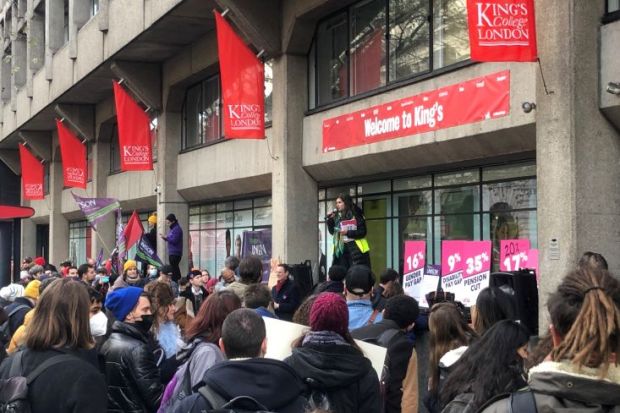The first date of the University and College Union’s next round of strike action has been confirmed as 1 February.
Up to 70,000 staff across 150 universities in the UK could take part in the action, which comes after a pay offer worth between 4 and 7 per cent was rejected by the union.
The UCU and representatives from other higher education unions met with negotiators from the Universities and Colleges Employers Association (Ucea) on 16 January, but no new offer was presented.
The latest round of university strikes coincides with action being taken by other unions including the National Union of Rail, Maritime and Transport Workers (RMT), the Public and Commercial Services Union (PCS) and the National Education Union (NEU). It has been dubbed a “protect the right to strike” day by the Trades Union Congress (TUC), in light of government plans to pass a bill through Parliament that would place a minimum service requirement on critical industries.
A further 17 days of strike action will take place across universities affected in February and March. The precise dates for this will be announced next week, the UCU said.
The unions have called for a pay increase of RPI inflation plus 2 per cent for 2023-24 or a flat rate of £4,000, whichever is the greatest. This rate of inflation reached 14 per cent in November 2022, and is projected to fall only slightly over the coming year. Employment experts have said the union might settle for closer to 8 per cent.
The UCU has also called for action on working conditions, short-term contracts and gender, race and disability pay gaps. About a third of the branches involved are also striking over cuts to pensions provided by the Universities Superannuation Scheme.
The union’s general secretary, Jo Grady, accused vice-chancellors of “dragging their feet” while the cost-of-living crisis “rages”.
She called on university leaders to use “the vast wealth in the sector to address over a decade of falling pay, rampant casualisation and massive pension cuts”.
“UCU remains committed to reaching a negotiated settlement, but if university employers don’t get serious and fast, more strike action fill follow in February and March,” Dr Grady added.
Raj Jethwa, Ucea’s chief executive, said employers had a “desire to support those on the lowest pay points who are most affected by cost-of-living pressures.”
“Despite unprecedented financial pressures facing employers, they have committed to an early pay round as a direct response to current cost of living concerns”, he added.
“These are significant financial risks for many HEIs [higher education institutions] who are also unable to forecast with certainty their income for 2023-24 and, while employers have a great deal of sympathy with staff coping with financial pressures, none could offer a pay award that would get close to current levels of inflation.
“We hope that our proposals will be recognised as a genuine attempt by employers to address cost of living pressures. UCU members do not want to take strike action that targets students. Employers do not want to deduct pay in response to such strike action that targets students. Now it is the time to talk,” Mr Jethwa continued.
“But UCU needs to provide its members with a realistic and fair assessment of what is achievable before giving them the chance to accept or refuse the highest HE pay offer made in nearly 20 years.”
Register to continue
Why register?
- Registration is free and only takes a moment
- Once registered, you can read 3 articles a month
- Sign up for our newsletter
Subscribe
Or subscribe for unlimited access to:
- Unlimited access to news, views, insights & reviews
- Digital editions
- Digital access to THE’s university and college rankings analysis
Already registered or a current subscriber? Login








